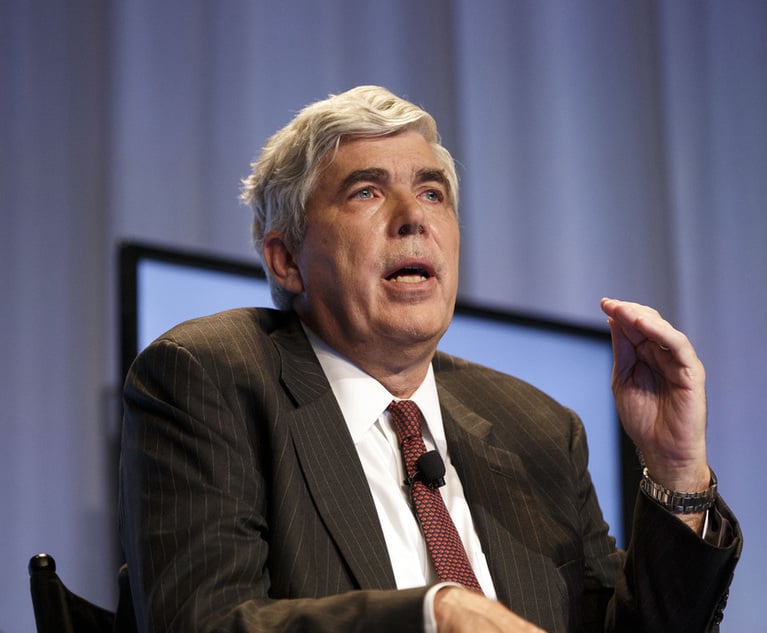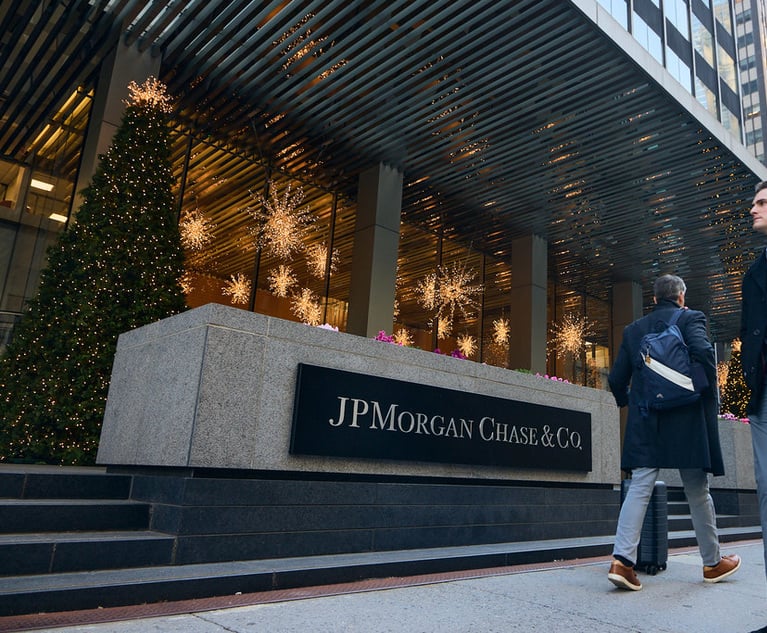Stockholder Pre-Suit Demand Review
In their Corporate Litigation column, Joseph M. McLaughlin and Shannon K. McGovern discuss the Delaware Court of Chancery's decision in 'City of Tamarac Firefighters' Pension Tr. Fund v. Corvi', which reminds practitioners of the steep burden facing a derivative plaintiff seeking to plead that a board wrongfully refused its pre-litigation demand and provides guidance on several recurring aspects of board responses to demands
June 12, 2019 at 12:30 PM
10 minute read
 Joseph M. McLaughlin and Shannon K. McGovern. Courtesy photos
Joseph M. McLaughlin and Shannon K. McGovern. Courtesy photos
A stockholder plaintiff seeking to bring derivative claims on behalf of a corporation must choose one of two paths. The shareholder makes the threshold directional decision whether to: (1) make a pre-suit demand on the board of directors asking it to pursue the alleged claim, or (2) initiate litigation, purportedly on behalf of the corporation, and allege that pre-suit demand is excused as futile. If a shareholder makes a demand on the board rather than alleging that demand is excused, in litigation challenging the demand refusal the law deems the shareholder to have conceded that a majority of the board is disinterested and independent for purposes of reviewing the demand. This in turn limits judicial inquiry to the due care and good faith of board consideration of the demand. When the board delegates to a special committee the consideration of a stockholder pre-suit demand, the question arises whether the stockholder's tacit concession of the full board's ability to consider the demand impartially extends to the committee. In City of Tamarac Firefighters' Pension Tr. Fund v. Corvi, 2019 WL 549938 (Del. Ch. Feb. 12, 2019), Delaware Vice Chancellor Kathaleen S. McCormick ruled that the “tacit concession” arising from pre-suit demand does not extend to the members of the special committee, so that a court evaluating whether plaintiff has offered particularized allegations of wrongful demand refusal may consider whether a committee to which demand review is delegated in fact conducted a reasonable investigation in good faith.
Background
Of the two potential paths available to a stockholder seeking to pursue derivative litigation—alleging demand excusal with particularity or making a pre-suit demand—“the former is a steep road, but the latter is 'steeper yet.'” Corvi, 2019 WL 549938, at *5. Once demand has been made, the shareholder lacks standing to pursue a derivative claim unless and until the board wrongfully refuses to assert the claim. By making pre-suit on the board, the stockholder tacitly concedes the disinterest and independence of a majority of the board members in responding. If demand is refused, the “tacit concession” by plaintiff that a majority of the board can fairly respond narrows the court's inquiry to the board's good faith and the reasonableness of the investigation, i.e., business judgment rule review. There is no prescribed procedure that a board must follow when investigating a demand under Rule 23.1. To survive a motion to dismiss, plaintiff must plead with particularity facts sufficient to create a reasonable doubt that (1) the board or special committee decision to deny the demand was consistent with its duty of care to act on an informed basis (i.e., was not grossly negligent); or (2) the board or special committee acted in good faith, consistent with its duty of loyalty. Ordinarily, the plaintiff is not entitled to discovery in the derivative action in seeking to meet the particularized pleading requirements of Rule 23.1.
'Corvi'
In Corvi, a stockholder of United Continental Holdings, Inc. sought rescission and return of amounts paid under the company's separation agreements with certain executives entered into after government investigations into alleged bribery involving the CEO. Plaintiff made two pre-litigation demands on the United board. It made an initial pre-suit demand on the board to recoup compensation from the CEO and the other United executives and modify its clawback policies. The board delegated consideration of the initial demand to a special committee of ten independent directors. Five of the ten committee members also had previously negotiated and approved the separation agreements with the executives. The special committee considering the demand retained the service of the same counsel it had used in negotiating the separation agreements. Five months after receiving the demand, the committee rejected it in a letter detailing its significant investigation.
Asserting wrongful demand refusal, the stockholder plaintiff sued the CEO and the 15-member board alleging breach of fiduciary duty and waste, arguing that the board was grossly negligent in delegating the demand to the same special committee initially formed to oversee the company's response to government investigations into the bribery allegations. The plaintiff argued that the board's delegation of the demand to the committee was grossly negligent (and therefore not protected by the business judgment rule) because, having approved the separation agreements, the special committee could not impartially consider whether payments made under the agreements should be clawed back. After defendants moved to dismiss the putative derivative complaint, plaintiff issued a supplemental demand, which prompted the special committee to form a subcommittee comprising five of its members who were not on the special committee (or the board) when the separation agreements were approved. The subcommittee used the same counsel the full committee had used on the initial demand. Two months after receiving the supplemental demand the subcommittee rejected it, citing the findings of the government investigations, the challenges of successfully rescinding the separation agreements, and the disruption to or distraction from the company's business that the demanded litigation would cause.
Defendants sought dismissal of the putative derivative complaint under Rule 23.1, arguing that Spiegel v. Buntrock, 571 A.2d 767 (Del. 1990), limited the court's demand refusal review to the good faith and reasonableness of the committee's investigation, and precluded examination of committee-level conflicts of interest. In Spiegel, the board had formed a committee to respond to a plaintiff's pre-suit litigation demand. The Spiegel plaintiff argued that the board's formation of the committee was a concession that the board was conflicted on the subject of the demand. The Delaware Supreme Court rejected this argument, stating that “[t]he same standard of judicial review is applicable when a board delegates authority to respond to a demand to a special litigation committee. The issues are solely the good faith and reasonableness of its investigation.”
In Corvi, the Court of Chancery rejected defendants' assertion that Spiegel precluded evaluation of committee-level conflicts, concluding “that the plaintiff's tacit concession does not establish for all purposes the disinterest and independence of every member of the board.” The concession only acknowledges that a majority of the full board would have been capable of considering a demand. Delaware law requiring courts to consider director bias or self-interest when evaluating whether a board acted in good faith when responding to a demand, the court reasoned, also required the court to consider whether the board acted with due care and in good faith when delegating demand review to a special committee. The court's evaluation into good faith and due care must include “whether the members of the committee were 'biased [or] lacked independence,' in addition to whether the committee conducted a 'reasonable investigation.'” To bolster its conclusion, the court offered an extreme hypothetical of a board with nine independent directors and the CEO: A stockholder demands that the board claw back the CEO's compensation; the board establishes a one-person special committee consisting of the CEO and empowers the committee to respond to the demand; the CEO refuses the demand. “[I]t is easy to understand,” the court stated, “why the board's decision to delegate the litigation demand to the CEO could be grossly negligent or evidence of bad faith. A court can only reach this conclusion, however, by analyzing whether the CEO is conflicted. Under Defendants' reading of Spiegel, the making of demand would concede even the disinterestedness and independence of the CEO, such that a reviewing court would have to blind itself to the obvious conflict that the CEO faced when considering the demand.”
As the application of these principles in Corvi shows, the stockholder's burden to allege wrongful demand refusal remains daunting. A putative derivative plaintiff challenging a demand refusal by a special committee with delegated authority to review the demand must allege particularized facts creating a reasonable doubt that the board acted with due care (i.e., was grossly negligent) in authorizing the special committee to consider a stockholder demand. The court's evaluation of such allegations may entail consideration of allegations that the special committee was incapable of acting disinterestedly and independently in responding to the pre-suit demand. In Corvi, the court rejected plaintiff's argument that certain committee members' prior involvement in the decision to approve the separation agreements compromised their ability to consider a demand impartially, in the absence of any facts suggesting “a financial or personal benefit.” As to the initial demand, the court held that no special committee member was conflicted concerning the request that the board exercise rights under the clawback provisions which had been in place prior to their board service: “A person is not conflicted when deciding whether to exercise a contractual right for which that person negotiated, at least not by reason of the fact that the person negotiated for the right.” As to the supplemental demand, the court noted that none of the five directors on the second subcommittee were involved in the decisions to approve the separation agreements, which negated plaintiff's prior-involvement theory as to the supplemental demand.
Conclusion
In addition to reminding practitioners of the steep burden facing a derivative plaintiff seeking to plead that a board wrongfully refused its pre-litigation demand, Corvi provides guidance on several recurring aspects of board responses to demands. A court's demand refusal analysis may consider particularized allegations addressing whether directors (or a committee) acted disinterestedly and independently when investigating and responding to a stockholder demand. It is important to eliminate or neutralize any potential basis for subsequent challenge the independence of any committee member or its counsel. Whether board member or special committee member, any director participating in the review process should have no material personal interest in the relevant underlying transaction or face a substantial risk of personal liability arising from the transaction (and must be independent from any person who has such interests). Corvi illustrates that plaintiffs asserting wrongful demand-refusal also will look for potential conflicts arising from director involvement in the negotiation or approval of the relevant transaction. Particularly when recusal of certain directors does not alleviate conflict concerns, this leads some boards to appoint a new director or directors with no connection to the transaction to evaluate a demand. But Corvi further teaches that whether director “prior involvement” exists and presents conflict concerns depends on the facts, including what aspect of transaction is challenged.
The importance of conflict-free counsel to the board or demand review committee prominently features in Corvi—the selection of qualified and independent counsel goes directly to consideration of the board's due care in responding to the demand. For most demands, under board or committee supervision independent counsel takes a leading role in structuring and performing the investigation. Counsel properly may do the heaviest lifting, including the formulation of search terms for documents, the initial review and culling of documents, and if appropriate even conduct all of the witness interviews—as long as counsel receives adequate input and direction from the board or review committee.
Joseph M. McLaughlin is a partner and Shannon K. McGovern is an associate at Simpson Thacher & Bartlett.
This content has been archived. It is available through our partners, LexisNexis® and Bloomberg Law.
To view this content, please continue to their sites.
Not a Lexis Subscriber?
Subscribe Now
Not a Bloomberg Law Subscriber?
Subscribe Now
NOT FOR REPRINT
© 2025 ALM Global, LLC, All Rights Reserved. Request academic re-use from www.copyright.com. All other uses, submit a request to [email protected]. For more information visit Asset & Logo Licensing.
You Might Like
View All
Private Equity Giant KKR Refiles SDNY Countersuit in DOJ Premerger Filing Row
3 minute read
Trump Mulls Big Changes to Banking Regulation, Unsettling the Industry

Trending Stories
- 1Uber Files RICO Suit Against Plaintiff-Side Firms Alleging Fraudulent Injury Claims
- 2The Law Firm Disrupted: Scrutinizing the Elephant More Than the Mouse
- 3Inherent Diminished Value Damages Unavailable to 3rd-Party Claimants, Court Says
- 4Pa. Defense Firm Sued by Client Over Ex-Eagles Player's $43.5M Med Mal Win
- 5Losses Mount at Morris Manning, but Departing Ex-Chair Stays Bullish About His Old Firm's Future
Who Got The Work
J. Brugh Lower of Gibbons has entered an appearance for industrial equipment supplier Devco Corporation in a pending trademark infringement lawsuit. The suit, accusing the defendant of selling knock-off Graco products, was filed Dec. 18 in New Jersey District Court by Rivkin Radler on behalf of Graco Inc. and Graco Minnesota. The case, assigned to U.S. District Judge Zahid N. Quraishi, is 3:24-cv-11294, Graco Inc. et al v. Devco Corporation.
Who Got The Work
Rebecca Maller-Stein and Kent A. Yalowitz of Arnold & Porter Kaye Scholer have entered their appearances for Hanaco Venture Capital and its executives, Lior Prosor and David Frankel, in a pending securities lawsuit. The action, filed on Dec. 24 in New York Southern District Court by Zell, Aron & Co. on behalf of Goldeneye Advisors, accuses the defendants of negligently and fraudulently managing the plaintiff's $1 million investment. The case, assigned to U.S. District Judge Vernon S. Broderick, is 1:24-cv-09918, Goldeneye Advisors, LLC v. Hanaco Venture Capital, Ltd. et al.
Who Got The Work
Attorneys from A&O Shearman has stepped in as defense counsel for Toronto-Dominion Bank and other defendants in a pending securities class action. The suit, filed Dec. 11 in New York Southern District Court by Bleichmar Fonti & Auld, accuses the defendants of concealing the bank's 'pervasive' deficiencies in regards to its compliance with the Bank Secrecy Act and the quality of its anti-money laundering controls. The case, assigned to U.S. District Judge Arun Subramanian, is 1:24-cv-09445, Gonzalez v. The Toronto-Dominion Bank et al.
Who Got The Work
Crown Castle International, a Pennsylvania company providing shared communications infrastructure, has turned to Luke D. Wolf of Gordon Rees Scully Mansukhani to fend off a pending breach-of-contract lawsuit. The court action, filed Nov. 25 in Michigan Eastern District Court by Hooper Hathaway PC on behalf of The Town Residences LLC, accuses Crown Castle of failing to transfer approximately $30,000 in utility payments from T-Mobile in breach of a roof-top lease and assignment agreement. The case, assigned to U.S. District Judge Susan K. Declercq, is 2:24-cv-13131, The Town Residences LLC v. T-Mobile US, Inc. et al.
Who Got The Work
Wilfred P. Coronato and Daniel M. Schwartz of McCarter & English have stepped in as defense counsel to Electrolux Home Products Inc. in a pending product liability lawsuit. The court action, filed Nov. 26 in New York Eastern District Court by Poulos Lopiccolo PC and Nagel Rice LLP on behalf of David Stern, alleges that the defendant's refrigerators’ drawers and shelving repeatedly break and fall apart within months after purchase. The case, assigned to U.S. District Judge Joan M. Azrack, is 2:24-cv-08204, Stern v. Electrolux Home Products, Inc.
Featured Firms
Law Offices of Gary Martin Hays & Associates, P.C.
(470) 294-1674
Law Offices of Mark E. Salomone
(857) 444-6468
Smith & Hassler
(713) 739-1250







